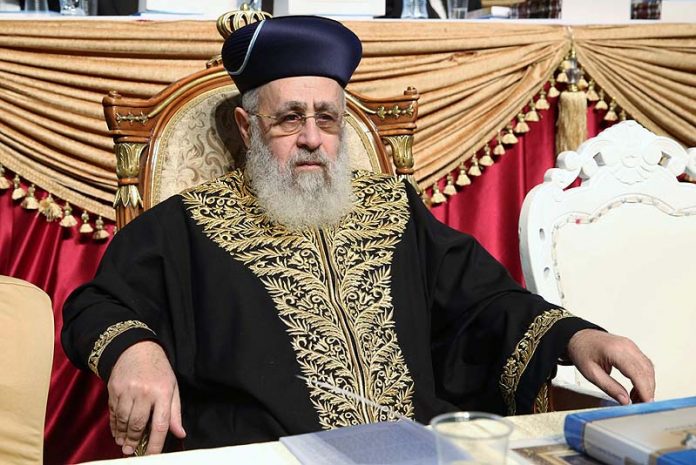{Originally posted to the author’s website}
One must wonder what Sephardic Chief Rabbi Yitzhak Yosef was thinking when last week he launched into a tirade against non-Jewish Russian immigrants to Israel and those Orthodox rabbis who seek welcoming ways to convert some of them.
‘);
_avp.push({ tagid: article_top_ad_tagid, alias: ‘/’, type: ‘banner’, zid: ThisAdID, pid: 16, secure: true });
What was he trying to achieve when denigrating the masses of Russian Israeli olim as “goyim who go to church every Sunday”; when disparaging Jewish Agency officials who facilitate their aliyah as “religion haters who seek to diminish the power of haredi parties in Israeli politics”; when savaging Rabbis Shlomo Riskin, David Stav and David Bas as “reform Jews” that conduct phony “conveyor belt” conversions?
Had Rabbi Yosef’s remarks not been delivered in such foul fashion, and each of the above statements so defamatory, one might have charitably thought that he was trying to make a legitimate point.
One might have thought that Yosef was seeking to spark a serious and needed debate about the problematics of bringing so many Russian non-Jews to Israel (upwards of 400,000), or at least drive parliamentary reconsideration of the “grandchild clause” in the Law of Return (which is core to the problem).
One might have thought that he was considering taking more responsibility for handling the screaming-to-heaven need for Orthodox conversion outreach to Russian-Israeli non-Jews, in a positive way that might somewhat defuse the enormous demographic and societal time bomb posed by the current situation.
But no. Rabbi Yosef’s outburst is characteristic of his generally sour, angry demeanor and his politicized approach to his post as chief rabbi.
Yitzhak Yosef was mainly responding to the violent anti-religious campaigning of that base rabble-rouser, Avigdor Lieberman, and his Yisrael Beiteinu henchmen (extremists like Alecs Kushnir and Lazar Kaplun). Unfortunately, Yosef’s eruption provides fodder for Lieberman’s political campaign in advance of Israel’s March elections.
This is doubly disconcerting, because pouring more oil on the religion-state fires is irresponsible and makes it harder to deal concretely with the real issues at hand.
A temperate and responsible chief rabbi with a broad understanding of how aliyah and conversion policies are core to Israel’s social and spiritual future would instead offer deep reflections on the following complicated issues:
What’s the bigger danger to Jewish Peoplehood? Absorbing half-a-million non-Jews as permanent Israeli citizens who will end-up marrying Jewish Israelis without converting (and in the process will probably force introduction of civil marriage in Israel); or a mild “watering down” of halachic (Jewish law) standards in order to facilitate more conversions?
Does the responsibility for running a sovereign Jewish nation for the first time in 2,000 years make a difference in the way that Jewish law functions? Might the miraculous restoration of Jewish sovereignty, the ingathering of the exiles, and the imperative of creating a Jewish civic culture – militate for a difference in the fraction of halachic observance (kabbalat ol mitzvot) considered enough for conversion to Judaism?
What is stringency and leniency in this situation? Isn’t going the extra mile to convert Russian-Israelis indeed halachic stringency (and not halachic leniency), since it would stringently protect the Jewish majority in this country from sinning through intermarriage? (This is the approach of Rabbi Yaakov Ariel of Ramat Gan, who should have become chief rabbi in 2003 instead of the haredi candidate Rabbi Yona Metzger who ended up in jail for corruption).
Isn’t there room for Rabbi Shlomo Goren’s “Jerusalem Talmud” approach to conversion, as opposed to the Babylonian Talmud’s more stringent attitude toward conversion (which reflects the fact that it was composed in exile)? What about Rabbi Chaim Amsalem’s “Zera Yisrael” approach which makes allowances in the conversion process for potential converts who are of “Jewish seed” (meaning that they have a Jewish father or grandfather)?
Why not more broadly adopt the possibilities of giyyur ketinim (the conversion of minors), which is the approach adopted by Rabbi Nachum Rabinovich’s independent “Giyyur ke-Halacha” conversion courts? What about Rabbi Yosef Carmel’s creative mitochondrial DNA solution, which apparently can identify Jewish matrilineal descent through genetics?
And what about the proposals for centralization of halachic conversion courts in the Prime Minister’s Office tabled two years ago by a national commission on this matter headed by former justice minister Moshe Nissim (an Orthodox Jew and son of a former Israeli chief rabbi)? These proposals were opposed both by Haredi rabbis and politicians and by Religious Zionist rabbis and politicians because it would shut down their existing private conversion ventures; but it would also prevent Supreme Court intervention in conversion matters, which may be a clear, present and greater danger.
In sum, what constructive thoughts does Chief Rabbi Yitzhak Yosef have on these matters? What’s his strategy for handling the aliyah and conversion dilemmas – just do nothing? His vituperation we certainly can do without!
ANY PUBLIC POLICY discussion of this matter would be incomplete without recalling the political history which is responsible for the situation where short-sided haredi rabbis rule the Chief Rabbinate roost.
This is one more sad result of the ruinous Oslo peace process. In the 1990s, the political left gave the keys to Israel’s Jewish character to Ultra-Orthodox politicians in order to purchase haredi support for the Oslo process and the subsequent Gaza disengagement.
Haredi rabbis began a slow but inexorable conquest, with the backing of the reigning Labor Party, of city rabbinates, religious courts, conversion courts, municipal religious councils, and kashrut agencies, turning the Chief Rabbinate into an ossified, contrary force that has created more problems than it has solved.
Religious Zionist and Modern Orthodox rabbis, who had built and controlled the Rabbinate for the country’s first 40 years and who were generally much more attuned to the needs of the non-religious and Zionist public, were pushed out.
Prime Minister Netanyahu made the same Faustian bargain in 2013, when – for narrow political reasons – he supported the haredi candidate for chief rabbi, David Lau, over the religious Zionist candidate, Rabbi David Stav.
As far as most haredi rabbis are concerned, the many Russian non-Jews who came to Israel, and their children, can simply remain goyim – since haredi society has no intention of mixing with that public anyway.
This myopic approach echoes the stance of the 19th century Hungarian halachic sage, the Chatam Sofer, who wrote regarding Reform Jewry: ein achrayutam aleynu, meaning that “we take no responsibility for them.” In the current context, this means that haredi rabbinical leadership is dismissively saying that since it didn’t bring the Russian goyim to Israel, it takes no responsibility for solving the demographic-Jewish identity problem that secular Zionism has brought upon itself.
In fact, ein achrayutam aleynu was the exact phrase used by Rabbi Avraham Sherman’s outrageous haredi rabbinical court ruling in 2008 which sought to retroactively disqualify as illegitimate all Rabbi Druckman’s Russian conversions, even though they were recognized by the Chief Rabbinate.
Religious Zionists feel differently. They generally view the Russian immigration as a blessing from the Heavens; a gift from G-d that imposes a responsibility on rabbinical leaders of the generation to develop solutions so that intermarriage with non-Jews does not become a problem in Israel (as it has in the Diaspora).
In the meantime, Israel’s chief rabbis have offered no leadership whatsoever in this matter. Not only are they becoming irrelevant, I fear that the Chief Rabbinate will be taken formally apart, either by the Knesset or Supreme Court decisions. From my perspective this would be tragic, and perhaps still can be avoided.
Alas, the current vector makes this inevitable unless the Rabbinate wakes up and “converts” itself into a more creative Orthodox religious services provider.
‘);
_avp.push({ tagid: article_top_ad_tagid, alias: ‘/’, type: ‘banner’, zid: ThisAdID, pid: 16, onscroll: 10 });




